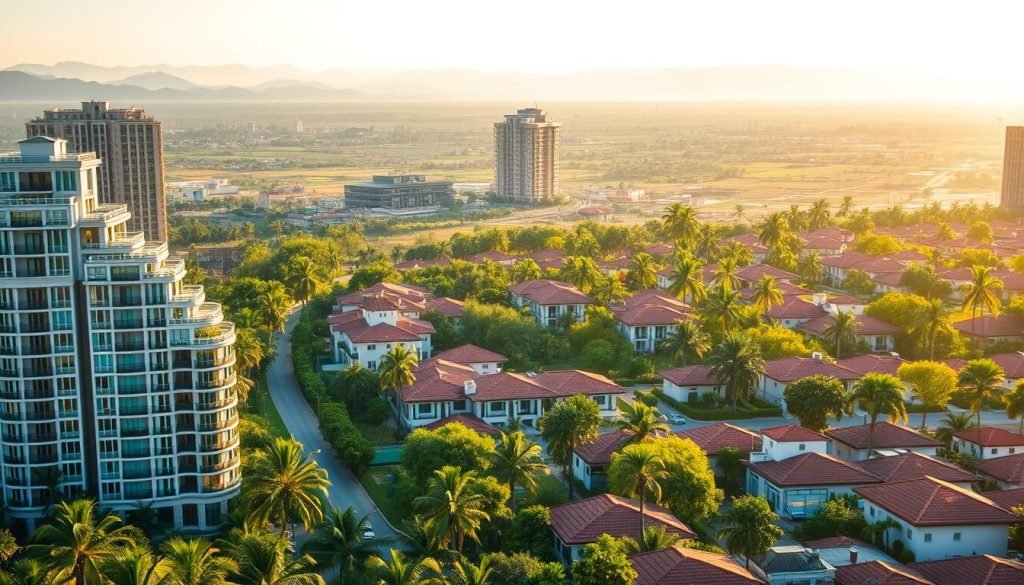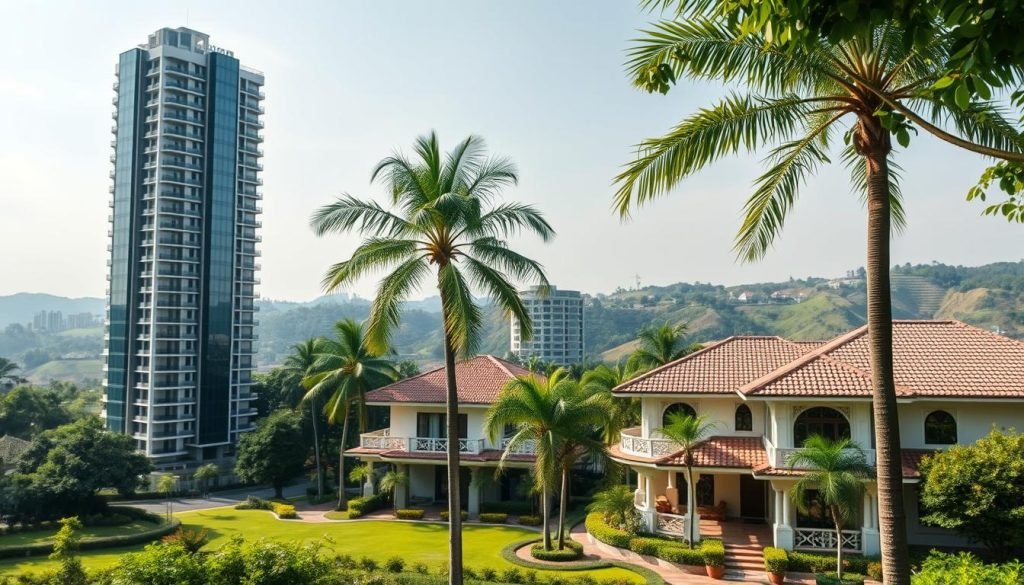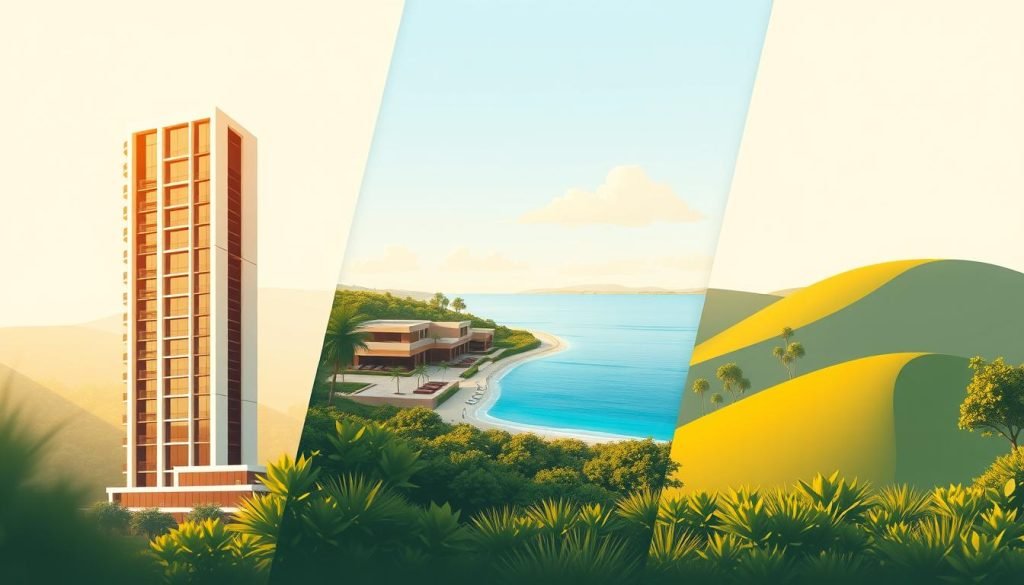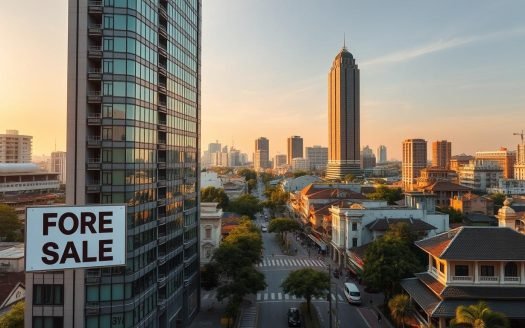Condos, Villas, or Land: What Should You Buy in Vietnam?

Thinking about investing in Vietnam property types? Vietnam’s economy is growing, and living costs are low. This makes it a great spot for foreign investors. You can pick from condos, villas, and land, each with its own perks and chances.
Choosing the right investment means knowing the local market well. The investment opportunities vary. Whether you want a holiday home, rental income, or to see your investment grow, Vietnam has it all.
Key Takeaways
- Vietnam offers a range of property options for foreign investors.
- The country’s growing economy and low cost of living make it an attractive destination.
- Understanding the local market is key to making a smart choice.
- Different property types offer unique benefits and opportunities.
- Investors should think about their goals, like a holiday home or long-term growth.
Understanding the Vietnamese Property Market
To invest wisely in Vietnamese property, you must understand the market. The market is changing due to government policies and more foreign investment.
Current Market Trends and Regulations
The Vietnamese government has set rules to guide the property market. These rules aim to prevent speculation and promote growth. Market trends show a rise in demand for quality properties in cities like Hanoi and Ho Chi Minh City. Knowing these trends helps you make a smart choice.
Foreign Ownership Rules in Vietnam
Foreign ownership in Vietnamese property used to have limits. But, the government has eased these rules to draw more foreign investment. Now, foreigners can own property in Vietnam, but there are some rules. For example, there’s a cap on how many properties one can own and a visa requirement. It’s important for foreign investors to know these rules, whether they prefer a condo vs villa.
Comparing Vietnam Property Types: A Complete Guide
Exploring Vietnam’s real estate, you’ll find many property types. Each has its own benefits. Knowing these differences is key to a smart investment.
Condominiums and Apartments
Condos and apartments are favorites for investors. They offer rental income and low upkeep. They’re in city centers, close to shops and services. Key benefits include a steady tenant flow and easy management.
Villas and Townhouses
Villas and townhouses provide more space, ideal for families or those wanting privacy. They’re in cities and suburbs, catering to various lifestyles. Notable advantages include ample space and value growth.
Raw Land and Development Opportunities
Raw land is for development, like homes, businesses, or farms. It needs a big investment and comes with risks. But, it can yield big returns. Investors must think about zoning regulations and development chances first.

Choosing between condos, villas, and land in Vietnam requires careful thought. Weigh each type’s pros and cons against your goals and budget. This way, you’ll make a choice that fits your financial plans.
Investing in Vietnamese Condominiums
Investing in Vietnamese real estate, condos are a great choice. They are popular in cities like Hanoi and Ho Chi Minh City. These condos offer modern amenities and are in prime locations.
Advantages of Condo Ownership
Buying a condo in Vietnam has many benefits:
- Luxury Amenities: Many condos have top-notch amenities like pools, gyms, and security.
- Prime Locations: They are in central areas, close to work, entertainment, and more.
- Potential for Rental Income: You can rent them out, making extra money.
Potential Drawbacks to Consider
But, there are also some downsides:
- Service Charges: You’ll have to pay service charges, which can go up.
- Regulations: There might be rules on renting or owning condos as a foreigner.
Best Locations for Condo Investment
Here are the top spots for condo investment in Vietnam:
- Ho Chi Minh City’s District 1 and District 2
- Hanoi’s Old Quarter and Tay Ho District
Legal Considerations for Foreign Buyers
Foreign buyers need to know the legal stuff about buying condos in Vietnam. This includes knowing the rules on owning and any limits.
In summary, condos in Vietnam can be a smart investment. They offer luxury and rental income. But, it’s important to think about the downsides and legal stuff, mainly for foreign buyers.
Exploring Villa and Townhouse Options
Vietnam’s property market is growing fast, with villas and townhouses being favorites among expats. These properties offer comfort, security, and good rental income chances.
Benefits of Villa Ownership
Buying a villa in Vietnam has many perks. Privacy and security are better than in apartments. Villas often have private gardens and pools, perfect for families or those wanting peace.
Also, villas in top spots can grow in value, making them a lucrative long-term investment.
Challenges and Maintenance Considerations
Yet, villa ownership has its downsides. Maintenance costs are higher because of gardens and pools. Also, securing villas might need extra effort and money.
Prime Locations for Villas in Vietnam
Some places in Vietnam are better for villa investments. Da Nang and Nha Trang stand out. They have natural beauty, culture, and modern comforts. It’s key to research these spots well to get the best returns.
Navigating Ownership Structures
It’s vital to know how to own villas and townhouses in Vietnam. Foreigners can own through leaseholds or companies. Always talk to legal experts to follow Vietnamese laws and make the right choices.
| Location | Average Price per Square Meter | Rental Yield |
|---|---|---|
| Da Nang | $1,200 | 5% |
| Nha Trang | $1,000 | 4.5% |
| Hoi An | $1,500 | 5.5% |
Land Investment Opportunities in Vietnam
Vietnam’s land market is changing fast, opening up new chances for investors. The country’s economic growth is boosting land demand. Both local and foreign investors are taking notice.
Understanding Land Rights and Restrictions
In Vietnam, land rules are strict, mainly for foreign buyers. The law says land belongs to the people but is managed by the state. Foreigners can get land use rights, but there are limits on how long and how often they can change hands.
Knowing these rules is key to doing well in the land market. Getting help from local legal experts can make sure you follow Vietnamese law.
Development and Risks
Investing in land in Vietnam could be very rewarding, thanks to its growth areas. But, there are risks like changes in laws and market ups and downs.
| Location | Development Opportunity | Risks |
|---|---|---|
| Urban Areas | High demand for commercial and residential spaces | Higher land prices, regulatory complexities |
| Rural Areas | Opportunities for agricultural development and eco-tourism | Lower liquidity, infrastructure challenges |
Strategic Locations for Land Purchase
Finding the right spot is essential for land investment success. Places near big cities, tourist spots, and new projects are usually in demand.
Working with Local Partners
Teaming up with local experts can give you a big edge. They know the market well and can help with buying and developing land. A real estate expert says, “Local knowledge is vital for finding good deals and avoiding pitfalls in Vietnam’s land market.”
“The key to successful land investment in Vietnam is understanding the local market and regulatory environment.”
Step-by-Step Guide to Making Your Decision
To make a smart choice about your Vietnam property investment, follow this guide. Buying property in Vietnam means thinking about your budget, goals, and lifestyle. These are key factors to consider.
Assessing Your Budget and Financing Options
First, check your financial situation. Look at your budget, financing options, and mortgage rates. Knowing your financial limits helps you choose the right property.
Balancing Investment Goals with Lifestyle Needs
Your investment should match your lifestyle. Want a vacation home? A villa might be perfect. For a rental, a condo could work better. Think about location, amenities, and rental income.
Evaluating Long-term Appreciation
Real estate value can grow over time. Look for areas with high growth, like tourist spots or new residential areas.
Calculating Rental Yields
To see if an investment is good, calculate the rental yield. This is the annual rental income divided by the purchase price. A higher yield means more profit.
Planning Your Exit Strategy
Plan how you’ll sell your property before buying. Think about resale value, market demand, and selling challenges.
| Property Type | Advantages | Disadvantages |
|---|---|---|
| Condo | Potential for high rental yield, amenities like pool and gym | Service charges, possible noise from neighbors |
| Villa | More space, possibly lower service charges | Higher maintenance costs, may be far from amenities |
| Land | Potential for long-term appreciation, development chances | Needs a lot of upfront money, regulatory risks |

By carefully considering these steps, you can make a choice that fits your goals and lifestyle.
Conclusion: Choosing the Right Vietnam Property Investment
Exploring Vietnam’s property types is exciting. You’ll find condos, villas, and land, each with its own benefits and challenges. Think about your budget, goals, and lifestyle to make the best choice for you.
Vietnam’s real estate market is full of opportunities. Its culture, landscapes, and economy make it a great place to invest. Picking the right property can lead to good returns and rental income.
FAQ
What are the foreign ownership rules in Vietnam?
Vietnam has made it easier for foreigners to own property. You can own up to 100% of a condo or villa. But, owning land is more complicated and has specific rules.
What are the advantages of buying a condo in Vietnam?
Condos in Vietnam offer many benefits. You can earn rental income and enjoy low maintenance costs. Plus, you get access to amenities like pools and gyms.
What are the benefits of investing in villas and townhouses in Vietnam?
Investing in villas and townhouses in Vietnam is a luxury. They offer more space and privacy. You can also earn rental income and see value increase over time.
Can foreigners buy land in Vietnam?
Yes, foreigners can buy land in Vietnam. But, there are rules and restrictions. You might need a local partner or company to help with the purchase.
What are the key considerations when buying property in Vietnam?
When buying property in Vietnam, think about your budget and financing. Balance your investment goals with your lifestyle needs. Also, research the local market and understand the regulations.
What are the most promising locations for property investment in Vietnam?
Vietnam has many promising locations for property investment. Major cities like Hanoi and Ho Chi Minh City are good. So are tourist spots like Da Nang and Phu Quoc. Choose based on your goals and preferences.
How do I ensure a successful property investment in Vietnam?
For a successful investment in Vietnam, do your research. Understand the local market and regulations. Work with experienced professionals like real estate agents and lawyers.




